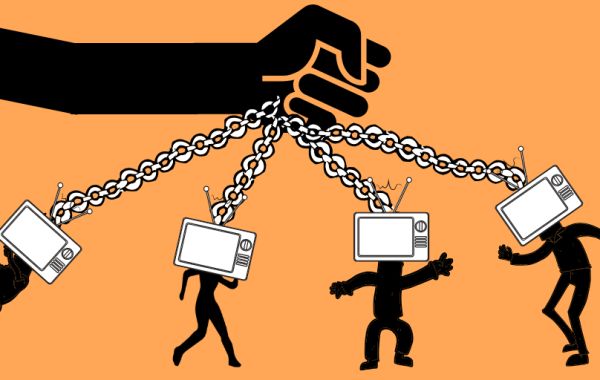Its techniques of persuasion invade human minds to make wide masses dance after the pipe of high and mighty. Modern society constantly finds itself under the pressure of task-oriented propagation, which is present in the mass media, art, politics, and other important components of human life. The following paper aims at discussing the role that propaganda plays in our lives today. Particularly, the focus of this piece of writing is on the influence of propaganda on popular music. Overall, the evaluation of facts shows that propaganda in popular music shapes people’s minds in almost every important area including viewpoints on morality, beauty, happiness, and sense of life.
Speaking about the role of propaganda in our lives and about its impact on popular music, it is important to define the very term “propaganda.” It comes from Latin and means “to extend, spread out, blow about, blow abroad or broadcast” (Maag, 2010). In the modern society, propaganda refers to the deliberate dissemination of particular ideas, messages or ways of thinking including ideological and political concepts, religious doctrines, or social perceptions (Buller, 2006). Propaganda does not send its message in an honest way when its objects are able to come to a certain conclusion through debate and being persuaded by the logical and well-weighted arguments. On the contrary, it appeals to human emotions. This allows the interested ones to manipulate the minds of their victims to the fullest extent (Conrad, 2011). The term “propaganda” became widespread during the period of Russian revolution (“Propaganda,” 2003). Since then, the phenomenon behind this word has had a huge impact on the most important areas of human life including popular music.
In popular music, propaganda found its reflections in many aspects. Mainly, in the initial period of the rise of popular music as it is known nowadays, propaganda majorly had political and ideological implications. According to “Propaganda” (2003), “the ideological functions of popular music were clearly apparent during the nineteenth century - as, for example, in the case of war songs, national songs, union songs and strike ballads.” In such kinds of popular music pieces as war songs, national anthems and songs, strike ballads, etc., political leaders aimed to transmit important political messages to their nations. Primarily, the messages purposed to raise the feeling of patriotism and devotion to the motherland among common people. Thus, propaganda in popular music had positive implications as well. However, at times, extremely harmful ideas were spread by the agents of propaganda in popular music. For instance, nationalistic songs in the Nazi Germany urged the subjects of Hitler to persecute and demolish “unclean” nations and “dangerous” groups of people.
Today, popular music is full of propagandistic implications. Since their youth, people find themselves subjected to a waterfall of different ideas, which can be qualified as propaganda. For instance, the majority of modern pop songs propagate materialism and free love. Another idea common in today’s popular music is seen in rap songs. Its essence is in the value of disobedience to authorities or any other people in charge of something or somebody (Buller, 2006). As a result of such bombarding of strong ideas appealing to human emotions and senses, modern society has experienced a serious shift in moral and spiritual values. Still, specialists on sociology and psychology mark that although people are now admitted to have more material possessions and are able to practice free sexual relationships without public condemnation, most of them feel unhappy (Buller, 2006). Being subjected to the effects of propaganda, people continue on a questionable course despite the fact that they are not able to experience real joy of it.
Nevertheless, someone may say that the phenomenon of sending particular messages in modern pop music is far from such a specific notion as propaganda. Such people explain their position by saying that music used to be a means to render certain ideas for centuries, but that does not mean that it had something in common with propaganda that existed in the former Soviet Union or the Nazi Germany and Italy. Without a doubt, these people are partially correct because in the above-mentioned regimes, propaganda was a special instrument that openly shaped people’s way of thinking. The leaders of those totalitarian regimes created a special atmosphere in which propaganda was utilized as the main component that affected a public opinion. Therefore, propaganda in popular music used to be a well-manifested phenomenon. However, today propaganda in popular music is concealed as hidden messages coming in a hidden manner. Still, propaganda in popular music exists, which can be seen in the unity of ideas spread by pop singers and bands.
Concluding all the above-discussed information of this us thematic essay, it is important to note that propaganda in popular music is one of the strongest powers that affect minds of masses. This kind of propaganda is especially successful because music is known for its strong ability to influence human emotions. Using the “road” of human emotions, an interested person can achieve the best results in entering the mind and heart of the victim and shaping them. Today, popular music propagates the idea that happiness comes from possessing material riches and free love, whereas disobedience is a way out of social problems. The difference of propaganda in popular music from the other kinds of propaganda is in the fact that it is not so apparent; on the contrary, it is hidden and “hooded.”







